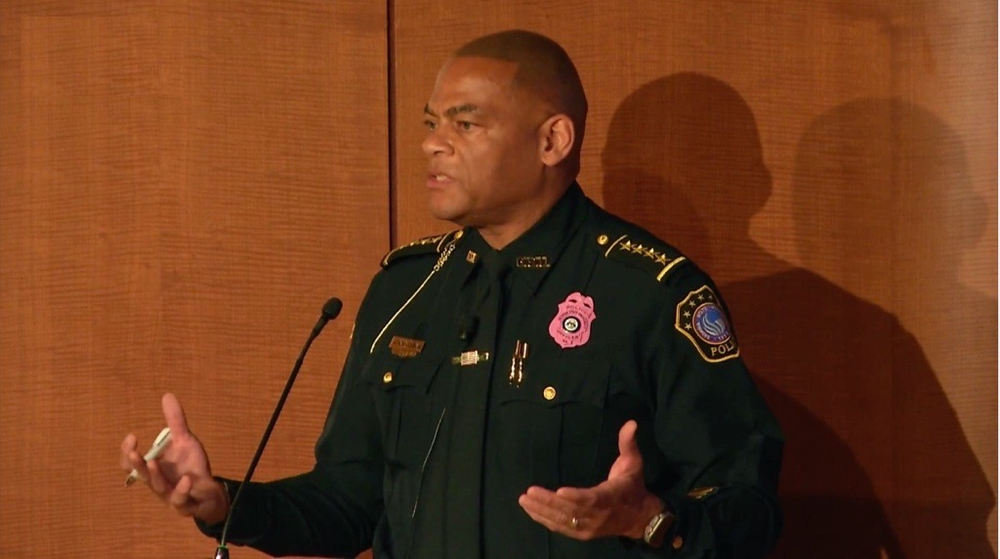
Caption
Georgia State University Police Chief Anthony Coleman speaks at a town hall meeting on Oct. 30, 2023 following a nearby Oct. 29 shooting that injured four people, including two GSU students.
Credit: GSU / screenshot
Georgia State University leadership held a listening session and town hall Monday to address ongoing crime near the north end of its downtown Atlanta campus.
The meetings came after a shooting that injured four people, two of them students, early Sunday morning. As of Monday, three of those wounded were in stable condition and one was in critical condition.
Police said the shooting near the RaceTrac gas and convenience store stemmed from a dispute between two groups and a suspect is still at large. It's the same gas station where another Georgia State student died in a December shooting. A different man was also shot there in April, WXIA-TV reported.
Three of the four corners house Georgia State University buildings, including the school's main dining hall, its university health center and the offices of the provost. Two dorms run by the university are also nearby. The northwest corner houses the RaceTrac on the ground level of a high-rise student apartment complex called The Mix, which is not affiliated with the school.
GSU president M. Brian Blake and its police chief, Anthony Coleman, said in Monday's meeting that the school, in conjunction with the Atlanta Police Department and state police, had increased monitoring on the corner this year, put metal plates in the road to prevent street racing and sideshows and worked with RaceTrac and The Mix on managing crowds and gatherings.
The block previously housed a small building with a kidney dialysis center and a "shady Shell," described in a 2019 story by The Signal, GSU's independent student newspaper, as a location for "aggressive panhandling" and gatherings that students worried would increase with the addition of 600 new residents at the Mix and the new RaceTrac, which opened just before the COVID pandemic began.
The intersection of John Wesley Dobbs Avenue and Piedmont Avenue in downtown Atlanta has a long history of crime. One man was shot during a robbery attempt there in March 2021 and two people were robbed at gunpoint at the corner in November 2021, among other incidents.
Blake said the most frequent questions he receives about the intersection involve the population of unhoused that frequent the corner and the status of the corner including a gas station.
"We [Georgia State University] can't remove or solve homelessness," he said, referring to comments that some areas adjacent to Georgia Tech's campus had improved safety in the past few years. "We're always going to be a city campus. It's unlikely we're going to close Piedmont or Courtland coming through our campus. There are several parks in our space... we control some of them but not all of them. The homeless are citizens, and they have rights as well."
Blake said GSU would work with the city to "curate" the campus with interconnected green spaces so that students would "feel safe in those spaces."
Unhoused people are not reported to have been involved in the perpetration of recent gun violence in the area.
About the gas station question, Blake said: "I get this one online, I get this everywhere else: 'Can we close RaceTrac?' Let me start by saying we don't own RaceTrac. I believe there was an attempt to purchase that land at the time in which they built The Mix apartment complex.
Blake continued: "One of the comments we received was 'could we prevent certain operations of the RaceTrac and other businesses in our area that might be a nuisance to our space?' And one of the comments we received from the city was if that becomes an impactful thing for us as a campus and our citizenships, there are processes they can do to monitor that. So I do feel pretty positive from that response.
"We're going to double our efforts with the city to make sure all businesses, not just the RaceTrac, are operated in ways that makes our community even more safe," Blake said.

Georgia State University Police Chief Anthony Coleman speaks at a town hall meeting on Oct. 30, 2023 following a nearby Oct. 29 shooting that injured four people, including two GSU students.
Blake said he communicated with Atlanta Mayor Andre Dickens Sunday morning. "Both of us agree, that as we move forward, we gotta look for, maybe there's even more drastic actions we can take in that corridor."
Chief Coleman said his staff is working with Atlanta police, the Georgia State Patrol and Fulton County Sheriff's Department "to police that area and to reduce crime in that area."
Coleman said in a recent two-day stint, law enforcement "made over 30 arrests. We covered a stolen vehicle and some stolen guns," he said. "So we are actively patrolling that area and we will continue to do that. When we see RaceTrac getting too, what I say is, 'out-of-hand,' where there's a lot of traffic, a lot of vehicles coming in there, we go in and tell management, 'Hey, we're shutting it down. There's too many vehicles out here.'
The school's executive vice president and operations officer, Jared Abramson presented slides listing updates to GSU campus building doors and call stations as well as plans for increased lighting and a "Blue Line" inspired by Atlanta's BeltLine that would encircle the campus with connected walkways and greenspaces.
GSU vice president of student engagement, Michael Sanseviro, ended the meeting with information for students who are concerned or traumatized by the ongoing violence, saying students should visit the Office of the Dean of Students web page for emergency assistance, counseling or other needs. For emergencies, call 911.